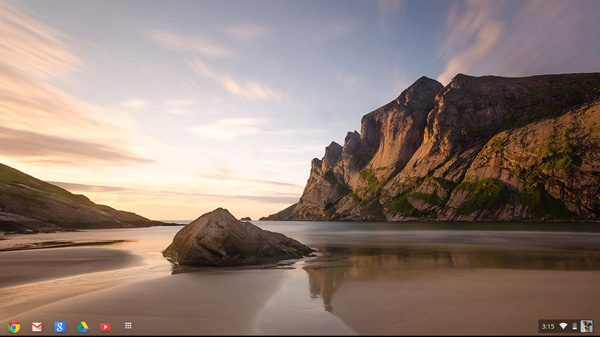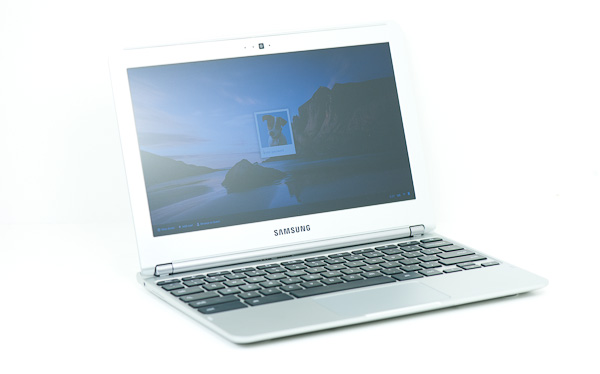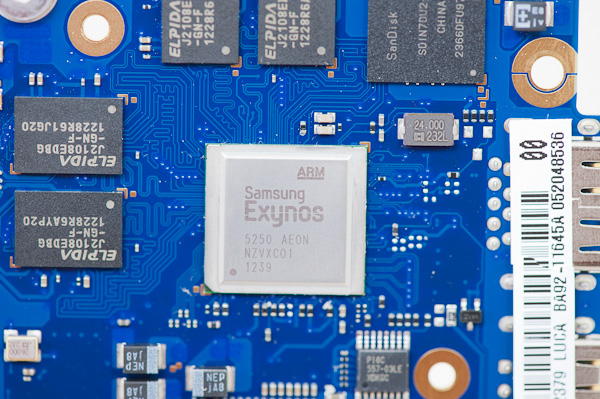Samsung Chromebook (XE303) Review: Testing ARM's Cortex A15
by Anand Lal Shimpi on October 31, 2012 9:00 AM ESTGoogle announced the Chrome OS project two years ago, and with it came the first Chromebook: the CR-48. The Chrome OS concept seemed revolutionary at the time. In 2010 we were well into the latest round of questioning whether today's PCs were fast enough. The Ultrabook revolution hadn't yet begun, and the iPad was starting to gain momentum. Capitalizing on the market being flooded with poor quality, yet affordable PC notebooks that still struggled with the same virus/malware issues they'd been facing for years, Google took the opportunity to attempt to revolutionize the PC OS.
Chrome OS was that attempt at a revolution. As an OS built around a web browser, Chrome OS offered many of the advantages that the Chrome browser itself brought to the table: sandboxing, guest mode and constant/painless updates. All user data is encrypted on the drive by default. Security was and remains a major feature of Chrome OS.
Google's revolution extended to hardware as well. The Cr-48 notebook delivered a good keyboard, trackpad and solid state storage. Future Chromebooks would do the same. While the price points of these machines (<$500) kept ultra high resolution IPS displays out of the bill of materials, Google promised good build quality and solid state storage - two things you couldn't find in cheap notebooks of the time.
Since then, some of the traditional PC makers have woken up. Although confined to the $999+ price point, we're finally seeing attention paid to build quality, display quality and storage performance. Over the next couple of years there's going to be increased focus on bringing those premium features down to sub $700 price points.
For Chrome OS and Google's Chromebooks to remain relevant, they also had to move down the pricing stack. With its most recent announcement, Google has done just that. The new Chromebook (Samsung XE303C12) is priced at $249, while maintaining much of what made its predecessors interesting.
Even more interesting than its aggressive price point is the choice of SoC inside Google's new Chromebook: Samsung's Exynos 5 Dual, featuring two ARM Cortex A15 CPU cores. This move makes the new Chromebook the very first non-x86 machine to ship with Chrome OS. Given that I also happen to have a dual-core Atom based Chromebook from 2011, the new Exynos 5 based machine gave me a unique opportunity to get a preview of how ARM's next-generation CPU core would stack up against Atom.













149 Comments
View All Comments
zappb - Wednesday, October 31, 2012 - link
looks awesome - between this and the Nexus 10Flunk - Wednesday, October 31, 2012 - link
I recommend the Nexus 10, better screen and OS. ChromeOS is a real turkey.quiksilvr - Wednesday, October 31, 2012 - link
It really boils down to what you need. If you can live without a keyboard, get the Nexus 10. If you are on a budget, get this. If you want a keyboard and are willing to shell extra dough, get the Nexus 10 and a bluetooth keyboard.B3an - Wednesday, October 31, 2012 - link
He wasn't talking about keyboards and form factors. Chrome OS is almost completely useless for anything more than browsing the net. It's about equivalent to a basic feature phone in capability. It's for such a small niche, about the only people i could see buying Chrome OS notebooks are extremely poor students, and even then it probably wont do everything they want.jeffkro - Wednesday, October 31, 2012 - link
Another niche market is for people that do online investing and banking with significant assets. The added security of chrome OS is well worth having for $250 you won't find much cheaper insurance. Windows is just not safe for online financial transactions, which of course the poor student doesn't have to worry about.jeffkro - Wednesday, October 31, 2012 - link
By the way I find google docs to be pretty useful for productivity. I used to use open office and since I made the switch I haven't looked back. Netflix not being supported on the ARM version is kind of a bummer though. I think Google should make sure that Hulu, Netflix, and Amazon streaming all work as this definitely fits under the umbrella of cloud computing.damianrobertjones - Thursday, November 1, 2012 - link
Windows is safe... Don't run as full admin and maybe the user might have some common sense not to visit porn sitesklmccaughey - Thursday, November 1, 2012 - link
No, they can use a Chromebook to visit porn sites or any other activity (long list) that might get them on trouble in Windows.I maintain the computers (just) in my house and home office, and for one user I really wish he had a Chromebook and not a Windows laptop - I keep having to restore it from image.
Oh and I use Windows 7 x64 as my main machine, with Ubuntu VM for development.
Wolfpup - Friday, November 2, 2012 - link
Nothing wrong with porn sites...like any other business they're not especially wanting to screw over their customers.Sabresiberian - Friday, November 2, 2012 - link
ChromeOS is NOT more secure than Windows. You are putting too much stock in anti-Microsoft blather from Google. Might as well listen to Apple's opinion of Windows.Does this SoC even have the hardware security features built into Intel and AMD x86 chips (AES, Intel Secure Key, OS Guard)? I don't think it does. ChromeOS might require different methods to crack, but it is not more secure, and the hardware of the Chromebook is less secure.
Besides, I'd imagine any successful investor is going to be using something a lot more satisfying than a tiny, cheap netbook variation with a so-so screen.